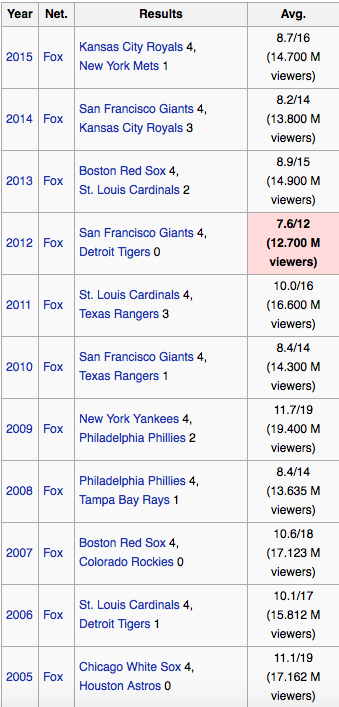The World Series matchup between the Chicago Cubs and the Cleveland Indians is a dream for Major League Baseball. Seeing the two longest suffering fanbases in the sport go head-to-head with the guarantee that at least one of their championship droughts will end is a historic occasion that is captivating the nation. On Major League Baseball’s ratings wish list, it could maybe only be surpassed by a Cubs-Yankees or Cubs-Red Sox World Series.
We know that MLB has hit the jackpot here, but just how rich will it be for our national pastime? World Series ratings, and more specifically the decline of World Series ratings, has been a major talking point for years. It’s safe to say that Cubs-Indians will buck that trend, but by just how much?
The latest
A helpful place to start looking is at the other major curse that recently came to an end with the 2004 Boston Red Sox. (Sorry for the snub once again Chicago White Sox fans, but I’m just following ESPN’s lead here in pretending you don’t exist.) By average viewership, it’s the most watched World Series since 1995’s Braves-Indians matchup the year after the strike cancelled the 1994 World Series. Making that statistic all the more impressive is the fact that it was a sweep. An average of 25.4 million watched the four Red Sox-Cardinals games in 2004. Eight years later, the World Series bottomed out in viewership when Giants’ sweep of the Tigers drew half of that with a paltry 12.7 million viewers.
Red Sox-Cardinals was also the last series to reach even the 20 million viewer barrier for the entire series. The closest to it was Yankees-Phillies (no surprise there) in 2009 with 19.4 million viewers over six games. Here you can see the average viewership for every World Series since 2005.
Will Cubs-Indians surpass all of those? Almost certainly yes, barring a streak of every game being 12-0 blowouts.
The question then becomes will it top the Red Sox-Cardinals World Series and become Fox’s highest rated and most watched World Series? As hard as it is to believe, Fox has now been broadcasting World Series games for two full decades.
Two factors work in the favor of the 2016 World Series. First, the Cubs’ streak/curse is longer and arguably more famous than even the Curse of the Bambino. The Red Sox had been in many World Series before 2004 with 1986 being their last appearance. This will be the first World Series the Cubs have even played in since 1945. That was so long ago we were in the middle of World War II and the Cleveland Rams won the NFL championship before moving to Los Angeles the next year.
Second, the Cubs have a huge national appeal with fans spread out over the country. Much of this is due to their games being played nationally on WGN over the years and being aired to a nationwide audience. Even though the Cubs ranked #3 behind the Red Sox in the latest Harris Poll popularity survey, the fun in jumping on the Cubs bandwagon and that long history of national television might make a greater push for them this year.
Tonight’s Game 1 will be a great barometer for how popular the series is nationwide. If it surpasses the 23.1 million that 2004 scored, it sets up for a record series this millennium. But even if it doesn’t, and the series goes beyond five or six games, it can surpass 2004’s recent high point because it was a sweep. The most watched World Series game since the strike is 2001’s Diamondbacks-Yankees Game 7 with 39.1 million viewers. If we get to that point, with the Cubs and Indians playing a World Series Game 7, baseball could get its highest ratings since 1991’s Game 7, which is the last time a baseball game drew 50 million viewers.
Anything is possible when it comes to viewership for this series, which is appropriate given the once-in-a-lifetime circumstances.








